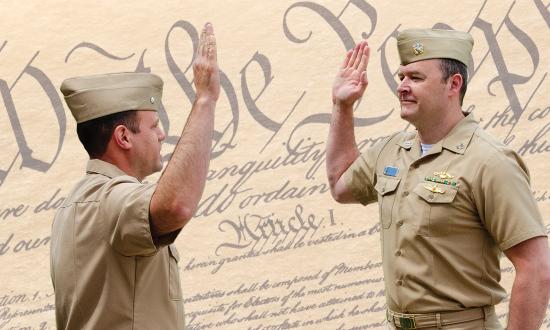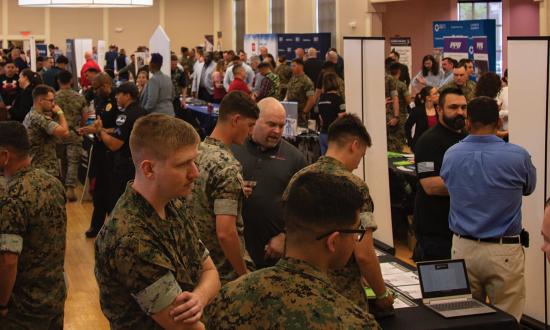Expeditionary logistics plans, long-range precision fires tactics, and F-35 electro-optical targeting systems are examples of the necessary developments of renewed great power competition. But the Marine Corps must never let the shiny how of the future fight crowd out the why. Since the end of World War II, the telos of America’s purpose has been drastically diluted.1 If the United States intends to implement a forward-looking Force Design, the Marine Corps must address the crisis of national spirit and recognize the generational forces that shape Marines. As an institution that claims to make Marines and return quality citizens, the Marine Corps must reimagine how it conveys citizenship and rekindle the vigor of its American duty.
Battle of Ideas
Great power competition demands understanding what power is for and what made it great. As William Inboden writes, in The Peacemaker, that President Ronald Reagan reversed the consensus of the 1980s and “saw the Cold War primarily as a battle of ideas, overlaid on a great power competition.”2 Reagan reoriented the Cold War as a stand-off between American ideals and Marxism-Leninism that would only end when one set of ideas tested the other.2 The Berlin Wall fell, and Soviet despotism crumbled with it. But the end of history did not follow.
Four thousand miles east of the Kremlin, in Fujian province, a young Chinese Communist Party official took notes. He remained in Fujian, rising to become its governor and received a doctoral degree in Marxist theory. By the time Xi Jinping became General Secretary of the Chinese Communist Party, he knew exactly what he believed. Marxist ideology would be the epicenter of every national action.
One month after becoming general secretary, Xi gave a close-door speech where he attributed a disregard of fervent communist principles as the main factor of Soviet collapse:
Why did the Soviet Union disintegrate? Why did the Soviet Communist Party collapse? An important reason was that their ideals and beliefs had been shaken. . . . It’s a profound lesson for us! To dismiss the history of the Soviet Union and the Soviet Communist Party, to dismiss Lenin and Stalin, and to dismiss everything else is to engage in historic nihilism, and it confuses our thoughts and undermines the Party’s organizations on all levels.
Xi has ensured that his People’s Liberation Army learns the “lesson.” In 2014, Xi implemented reforms to institutionalize Party purity as a key metric for military promotion. During his 2021 speech commemorating the Chinese Communist Party’s 100th anniversary, Xi demanded the military’s absolute loyalty to communism. In July 2023, Xi reiterated the Party “must maintain leadership over the armed forces in ideological, political, and organizational terms,” and ordered an education campaign to improve Party conduct and discipline among the armed forces. A Chinese rifleman knows his allegiance. He has no inalienable rights, or freedom of religion, or freedom of speech. His life is worth only in proportion to his usefulness to the Party.
As members of the U.S. armed forces, the Code of Conduct instructs us to be prepared to give their life in defense of “our country and our way of life.” How many Marines can honestly articulate what our “way of life” is?
Amnesia and Generation Z
There is a crisis of civic education in the United States. According to recent analysis by the National Assessment of Educational Progress, only 13 percent of eight graders are proficient in U.S. history and less than half of adults could name the three branches of government. Lower income students scored an average of 51 percent on the assessment, which is 11 percent below the basic proficiency threshold and 44 percent lower than higher income students. Another survey by the Institute for Citizens and Scholars found that only one in three Americans could pass the U.S. Citizenship Test. By the time a potential Marine meets a recruiter, U.S. schools have largely failed to properly expose them to the tenets of citizenship. Unsurprisingly, patriotism among young adults reached a record low in 2023.
The civic crisis cannot be treated in isolation from its generational factors. As members of Generation Z, 95 percent of young Marines have had access to a smartphone since the age of 13 and 64 percent use Instagram daily. Current Marines are more informed (and more misinformed), curious, and opinionated than any generation before them. In a given hour, their phones bombard them with strategic judgments about Ukraine, cookie recipes, Chinese-bot deep fakes, and political clips. With the amount of information at hand, it is predictable that young Marines constantly ask why.
Life for a young person is noisy and distracting. It is not Marines’ fault that, when they stepped on the yellow footprints, they did not yet understand American duty. But fault does lie with the institution they joined if it purports to make them better citizens and fails to equip them with a baseline of what that means.
American Sacramentum
As social beings, human identity is only as strong as the rituals that reinforce it. The Roman military is the quintessential example of a force that knew exactly for whom and why they were fighting. Prior to becoming a legionary, a Roman who completed recruit training would swear a sacramentum, or oath, to the emperor. The sacramentum was an essential rite of passage that “had the effect of dividing a soldier’s life into two periods; his former civilian life and his present career.”4 Libanius, the 4th century rhetorician, wrote how the sacramentum bonded the army together in loyalty to the emperor Julian:
By now he had assembled a force remarkable not so much in numbers as in morale. The men bound each other by compacts and agreements to go to every length and endure every hardship to ensure victory, and to fear only the disgrace that would be the consequence of negligence.5
The sacramentum not only proclaimed loyalty to the emperor but built cohesion among soldiers. At least once a year, soldiers swore to remain in service, to never avoid combat, and to never desert their post during garrison or in the face of the enemy. While breaking the sacramentum was punishable by death, a legionary who rebelled against his oath was already dead in the eyes of his brethren. Once his time in service ended, a soldier would be relieved of the burdens of his loyalty oath only through a formal ceremony, thus becoming again a civilian.6
In 2023, Marines swear an oath of enlistment once and repeat it upon reenlistment. Marines swear to support, defend, bear true faith, and give allegiance to the Constitution of the United States of America. The Constitution codifies a framework of government rooted in enduring principles of human nature and virtue—constantly elevating our gaze and reminding us of the type of people we ought to be.
Requiring every Marine to renew his or her oath of enlistment once a year, on or around 17 September (U.S. Constitution Day) would be a painless step in the right direction.
A Republic—If We Can Keep It
The United States is an experiment that by right should have never happened. Never had a people been so bold as to give themselves a government by “reflection and choice” rather than depending on “accident and force.” The 1776 Declaration of Independence manifested the essence of Liberty, which the Constitution in 1787 secured. Then, in 1838, Abraham Lincoln delivered a speech before the Lyceum of Springfield, Illinois recalling that foundational essence. After describing that, as a nation of freemen, “we must live through all time, or die by suicide,” Lincoln asked how we shall fortify against the danger of suicide. He answered:
Let every American, every lover of liberty, every well-wisher to his posterity, swear by the blood of the Revolution, never to violate in the least particular, the laws of the country; and never to tolerate their violation by others. As the patriots of seventy-six did to the support of the Declaration of Independence, so to the support of the Constitution and Laws, let every American pledge his life, his property, and his sacred honor;—let every man remember that to violate the law, is to trample on the blood of his father, and to tear the character of his own, and his children’s liberty.
Lincoln looked at his nation and saw the fissures of a house divided. He invoked the patriots of ’76 to illustrate the blessings his generation inherited from those who fought 62 years prior. But the fissures grew, and the war came. By 1865, 620,000 American lives had been lost to the Civil War.
Today, 82 years separate U.S. citizens from U.S. involvement in World War II. If the patriots of ’76 seem too far away, the warriors of ’41 are not . . . for now. Each year, the national memory of both the pain of war and joy of purpose fades further away. What unites the Marines of Tarawa and Guadalcanal to those of Fallujah and Marjah—and to those of Camp Lejeune and Camp Pendleton—are the same oath and the same timeless principles.
Onward to 2030
Beyond instituting an annual renewal of our oaths, we should be wary of mandates without bottom-up refinement. Nonetheless, here are a few ideas to embolden civic duty within our Marine Corps:
- Incorporate the U.S. Citizenship Test as a requisite for enlistment or graduation from bootcamp.
- Enforce the recitation of the noncommissioned and senior noncommissioned officer creeds prior to promotion. While the creeds do not explicitly mention constitutional principles, the essence of their message captures the duties of citizenship.
- Integrate civic education into enlisted and officer professional military education. For example, Marines should read the Constitution at the Corporals Course and deliver a brief talk addressing one of its themes.
- Provide more civic resources on-base. Plenty of veterans and elected officials live within driving distance of U.S. bases. There should be a robust speaking circuit of veterans and public servants exposing Marines to diverse aspects of citizenship.
In my platoon alone, we have Sergeant Sadrahajsayedjavadi, who is conversational in Farsi and the son of an Iranian immigrant; Second Lieutenant Liu, who is fluent in Mandarin and the son of Chinese immigrants; and Lance Corporal Sardaryan, who is fluent in Russian and emigrated from Armenia. Diversity of background but unity of purpose is our greatest weapon. No amount of enemy technology can replicate it. Semper Fidelis. Acta, non verba.
1. Telos is the ancient Greek term for an end, fulfilment, completion, goal or aim.
2. William Inboden, The Peacemaker: Ronald Reagan, The Cold War, and the World on the Brink (New York: Dutton, 2022), 11.
3. Inboden, The Peacemaker: Ronald Reagan, The Cold War, and the World on the Brink.
4. Mark Hebblewhite, “Sacramentum Militae: Empty Words in an Age of Chaos,” Circum Mare: Themes in Ancient Warfare, edited by Jeremy Armstrong and Lee L. Brice (Boston, MA: Brill, 2016).
5. Hebblewhite, “Sacramentum Militae: Empty Words in an Age of Chaos.”
6. Hebblewhite.






